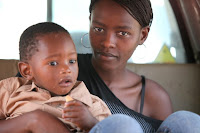We have Girls Club at 4 different schools throughout Soweto...
Mayibuye Primary School
As you can tell these are not our Grade 7 girls. Unfortunately, we have only been able to come to this school one time this term. When Girls Club is canceled I enjoy sitting on the sidelines while Zach has soccer clinic. I just love spending time in Soweto with people. These boys like to teach me Zulu. Please pray that Mayibuye will be available next term for us to come every Monday.

Hector Pieterson Primary School
At this school, we have a wonderful relationship with the Deputy Principal who is also a born again believer. We have enjoyed getting to know her and have even spent time with her outside of school. We always receive a warm welcome from these girls who seem to enjoy having us there. Please pray that these girls would understand of God's love for them.

Obed Messiane Primary School
We have only been to this school two times and I have not been able to get a picture of the girls. We do have good relationships with the teachers at this school. Please pray that we would be able to share the love of Christ not only with the girls but with the teachers as well.

Lehae Primary School
Look at these beautiful girls. We are hoping to meet with the girls and their parents during this holiday break to invite them to Lehae Baptist Church. Please pray that we would be able to minister to these girls and their families.

We have a box that we bring with us to Girls Club. We have explained to the girls that if they have any questions they can write it on a slip of paper and put it in the box. Many of the girls have no one to talk with besides friends who tend to give misinformation. I have shared some of the questions that were asked last year in Girls Club but here are some of the tough questions that we are facing this year... Pray for wisdom in how to address and answer these questions.
- What if you feel your parents don't like you and you feel lonely?
- If your friend love to sleep with boys and she don't want me to tell her parents that she sleeps with boys?
- People always tell how thin I am they say I am looking like a person who is HIV and I don't like it.
- There is this boy puts pressure on me telling me that he loves me. He keeps forcing me to love him to but I don't love him.
- If we die our we going to hell or heaven.
- I want to know that if your father left you when you were so small and you want to see him, how could you solve it. And you don't want to tell your mother.
- Does God hear us when we talk to him?
- What is rape? If someone has raped you what should you do if maybe you uncle or father does that to you. Do you have to go to counseling?
- What do you say when the boy says he love you?
Here is a video of some of our girls singing at Hector Pieterson. I love listening to their amazing voices!



















